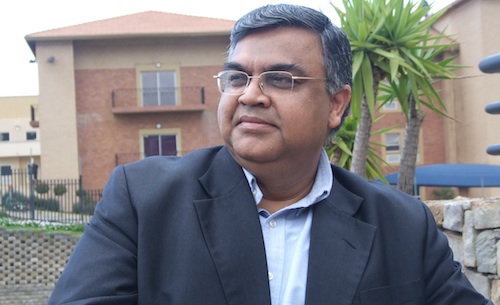
Neotel’s ability to continue as a going concern has been questioned by its independent auditors, Deloitte & Touche. But CEO Ajay Pandey, speaking to TechCentral in an exclusive interview, says there’s no reason for alarm and insists that the company is broadly meeting the targets set out in its business plan.
Deloitte & Touche’s warning is contained in Neotel’s 2010 annual report, a copy of which is in TechCentral’s possession.
The annual report, submitted to the US Securities and Exchange Commission (SEC) by its parent, India’s Tata Communications, paints a less than flattering picture of Neotel’s financial position as it prepares a round of retrenchments driven by an internal restructuring. Tata Communications has to submit the annual report under SEC rules.
Deloitte & Touche warns in its auditors’ report that Neotel’s “recurring losses and shareholders’ deficit raise substantial doubt about its ability to continue as a going concern”.
The annual report shows Neotel’s debt is mounting, too. Net debt stood at R5,3bn at the 2010 financial year-end in March, up from R3,1bn a year earlier. Shareholders’ deficit, also known as negative shareholders’ equity, climbed from R782m in 2009 to R1,7bn in 2010.
But Pandey insists there is no reason for investors or customers to worry and points out that the company is delivering strong top-line growth. He says December was Neotel’s best sales month on record with revenues of about R250m.
The growth in revenue will eventually flow through to the bottom line, Pandey says.
The company will turn Ebitda positive by the second quarter of calendar 2012, he predicts. Ebitda is earnings before interest, tax, depreciation and amortisation and is a key measure in evaluating the performance of companies still in their growth and investment phase.
The annual report shows that at the end of March 2010 Neotel had drawn R3,2bn of R4,4bn in debt facilities available to it from various financial institutions, including Nedbank and Investec. About R1,2bn of those facilities remained.
The facilities expire on 30 September 2012.
Pandey says Neotel’s bankers remain “fully supportive” of the company and are backing its restructuring programme.
Neotel had also drawn R2,3bn of R2,9bn in sanctioned funding from shareholders, leaving R633m available from this source of funding at the end of March.
Pandey says Neotel was not expected to be profitable yet in terms of its business plan. He says the company is on the right track, despite the restructuring exercise and looming redundancies.
He emphasises that Deloitte & Touche has not issued a qualified audit, but has simply expressed an “observation” about its ability to continue as a going concern. He says this is common practice in the auditing profession.
Neotel continues to enjoy the support of its parent company, Tata Communications, Pandey says, a fact that is borne out by the Indian company’s recent decision to increase its stake to above 50%.
However, the operator, licensed as the first competitor in fixed lines to Telkom, is clearly facing challenges. On two separate occasions last year it failed to meet targets for Ebitda agreed to with its external funders.
Pandey says disruptions caused by the soccer World Cup — like other telecoms companies, it was prohibited from working on its network for about three months around the football extravaganza, negatively affecting its ability to deliver on contracts to customers — played a part in its missing the targets. The economic recession also played a role.
Neotel is not the only telecoms company that has felt the economic pinch, Pandey says, pointing to recent job cuts at MTN, Nashua Mobile and Altech Autopage Cellular.
He says the company has not missed any interest payments on its debt. In 2010, Neotel paid R523,9m in interest on loans.
Of more concern, perhaps, is that Neotel’s cash position fell precipitously in the 2010 financial year. Cash and cash equivalents fell from R433,6m in 2009 to just R64,7m in 2010.
But Pandey insists Neotel is not facing a debt trap. In the annual report, Neotel’s directors say they are “satisfied the company has access to adequate resources to continue in operational existence for the foreseeable future”.
They base this on the fact that the company still had undrawn, committed funding facilities of R1,8bn at its 2010 financial year-end. They also cite the strength of Neotel shareholders Tata Communications and Tata Africa Holdings, which together hold 56% of the company’s equity.
The directors say they are confident they can manage the cash outflows stemming from Neotel’s heavy investment in telecoms infrastructure.
Neotel chief technology officer Angus Hay tells TechCentral that the 2010 financial year was one of heavy investment in infrastructure. This included big spending on undersea cables and data centres.
Hay says capital expenditure has now peaked and has begun falling. This will flow through to the bottom line.
The annual report shows Neotel incurred a loss before tax in 2010 of R1,58bn, growing from losses of R1,03bn in 2009 and R432,3m in 2008. Revenues, however, have surged in the same period, climbing from R1,1bn in 2009 to R1,8bn in 2010. Pandey says Neotel will be a US$1bn-revenue company within three years.
Neotel generated most of its revenue from enterprise and wholesale services in 2010. This business area contributed R1,3bn to the company’s R1,8bn in sales. Network services added R280m to the top line, with consumer services contributing R169m.
Though it’s a small player in the consumer market, Pandey dismisses suggestions that its retail consumer strategy has failed. He says it’s unfair to compare its subscriber numbers — estimated at about 50 000 — to the mobile operators, which have racked up millions of customers.
He says Neotel is going after niche consumer markets that are not adequately served by other operators.
Turning to the planned retrenchments, Pandey says Neotel needs to restructure to address “imbalances in some functions and departments”. He says Neotel is focusing more strongly on providing managed services to clients, and it needs to build capacity in that area. Some staff will be redeployed as part of this process; others will be retrenched.
Hay says the retrenchments are as a result of the need to refocus and restructure and are not being driven by the need simply to cut costs. — Duncan McLeod, TechCentral
See also: Trouble at Neotel as retrenchments loom
- Subscribe to our free daily newsletter
- Follow us on Twitter or on Facebook




